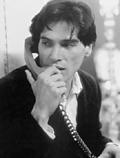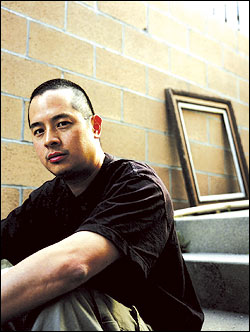The music business is a minefield of backhanded compliments, with few areas more treacherous than the language used to describe artists. Clich鳠like “critics’ darling” or “difficult genius” often mask less benign mirror images; they’re nicer ways of saying, “She doesn’t sell records,” or, “No one can stand him but he sells a lot of records.” But there may be no biz-speak phrase more obliquely damning than “songwriter’s songwriter,” which too often translates into either “The lyrics are really self-involved” or “Good for you in a genteel, boring way, like Merchant-Ivory films or plain granola” or, most damaging of all, “Good composer, but she can’t perform to save her life.”
Lucinda Williams and Amy Rigby are songwriter’s songwriters; they’re critics’ darlings, too, for that matter. (Williams’ “difficulties” will be dealt with later.) But their best lyrics have a rare empathetic reach, their best records are a lot of fun, and both women tend to sing their own material better than anyone else. Actually, it’s hard to say for sure with Rigby, since her songbook hasn’t garnered many covers yet. Williams, on the other hand, watched Patty Loveless run “The Night’s Too Long” up the country top 20 only months after Williams released it on 1988’s Lucinda Williams, her third disc, and Mary Chapin Carpenter would later make the country top five covering the same album’s “Passionate Kisses.” Carpenter and Loveless had the hits, but Williams’ versions, simultaneously tossed off and indelible, were the keepers.
Of course, that offhand quality was anything butfor years, Williams was more famous for her recording-studio perfectionism than her music itself. Yet most studio obsessives don’t create live-sounding roots-rock. Trent Reznor is easy to recognize as a studio rathis constant tinkering is evident in every second of Nine Inch Nails’ albums. Listen to Lucinda Williams or 1992’s Sweet Old World or 1998’s gold-certified commercial breakthrough, Car Wheels on a Gravel Road, and you’ll hear a very high-quality version of what you might hear any night of the week at a tavern. Except, of course, the songs were written by, you know, a songwriter’s songwriter.
ON 2001’S ESSENCE and the new World Without Tears (Lost Highway), Williams appears to be deliberately moving away from her old work methods’ precision. The music on Tears is a lot looser than usual; the band, a simple quartet led by Williams’ rhythm guitar, hits a relaxed groove on almost every song. It may be the most intimate music she’s ever made. The new songs also feel more impulsive, both in their subject matter (the 50-year-old Williams is a more overt horndog than she was at 35, and good for her) and in their construction. Tears abounds with near-rhymes”Sugarcane” with “queen,” “dis me” with “kissin’ me,” “mood” with “good”like she is verbally letting her hair down. Then she messes it around by slurring her words and drawing out her Lake Charles, La., accent until it threatens to wander off completely. Which can get annoying, actually: Yes, Lucinda, we know you’re from the South. Car Wheels on a Gravel Road has so many songs named after Southern cities that it’s practically a Rand McNally tribute album. But lift your tongue to the roof of your mouth every once in a while, just for appearances’ sake, would ya?
Then again, the material suits the approach. Much of World Without Tears is pointedly downcast, like the gloomy, muttered, last-call laments of “American Dream,” which ends every stanza with a simple “Everything is wrong,” or “Minneapolis,” in which Williams moans, “You’re a bad pain in my gut/I wanna spit you out.” So many songs sound like they’re meant to sum it all up that if you play the album in the background, almost every songfrom about “Overtime,” the disc’s fifth track, onwardsounds like it must be the last song on the album. It can be hypnotic, but just as often, Williams sounds like she’s in a holding pattern, her embittered, wildly romantic lyrical persona hardening into shtick.
AMY RIGBY’S LYRICAL guise, on the other hand, just keeps on giving. A former member of cheeky early-’90s indie girl group the Shams, Rigby’s solo debut, 1996’s Diary of a Mod Housewife, laid her out: a shakily married Brooklyn woman with a wry sense of humor, bouncing between temp jobs, nightclubs, and her husband and child. Two years and one divorce later, the title of her second album, Middlescence, summed up her stance: an adult who felt younger than her years and was more than a little tired of struggling to get by.
Now living in Nashville with her daughter and shopping her songs around to people as famous as she deserves to be, the 44-year-old Rigby still mines the same topics. But the new Til the Wheels Fall Off (Signature Sounds) keeps finding ways to make them newpartly because good songs about sexless marriages and watching your kids grow up are rare enough, partly because few songwriters are as pointed, whatever the subject. Or as funny: Wheels‘ instant classic is the blunt “Are We Ever Gonna Have Sex Again?” in which Rigby admonishes her long-standing partner, “Screw making love/It’s way too ambitious/Let’s get down on the rug/ After you’ve finished the dishes/Not now, hon, the eggs are frying/But you get extra points for trying/Maybe I can squeeze you in/Between the PTA and CNN.” If there’s any justice in the worldor, an even longer bet, in Nashvillesomeone with a big voice and bigger hair will take it top 20 country pronto.
Lucinda Williams plays White River Amphitheater, Auburn, at 7:30 p.m. Wed., July 16, with Neil Young and Crazy Horse. $28.50-$78.50 adv.








